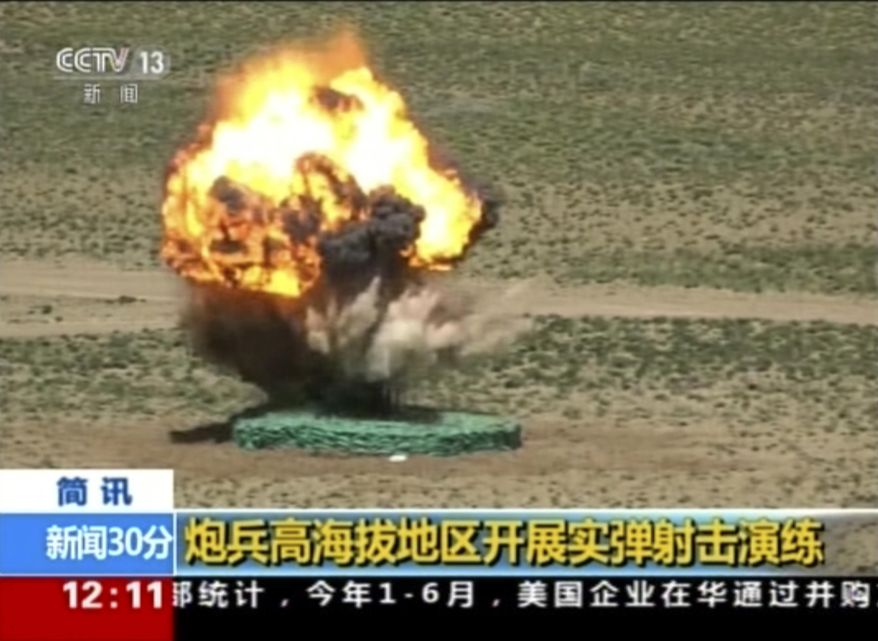Media Report

- The Washington Post reports: "Beijing is intensifying its warnings to Indian troops to get out of a contested region high in the Himalayas where China, India and Bhutan meet, saying China's 'restraint has its limits' and publicizing live-fire drills in Tibet. Indian troops entered the area in the Doklam Plateau in June after New Delhi's ally, Bhutan, complained a Chinese military construction party was building a road inside Bhutan's territory. Beijing says Doklam is located in Tibet and that the border dispute between China and Bhutan has nothing to do with India... On Friday, China Central Television broadcast video it said showed an army unit in an unidentified part of Tibet carrying out live-fire firing exercises in the past few days. A commander sitting in a vehicle shouted "3, 2, 1, fire!" into two telephones and a missile was launched into the sky... The report, which was also carried in other state media, didn't mention the dispute with India, and said the unit has been training for three months. It appeared to be an attempt to increase pressure on India, however, along with strongly worded statements this week from China's foreign and defense ministries, as well as in state media."
- Brookings comments: "The Trump administration is reportedly deliberating imposing a set of economic measures to punish China. The timing is telling: It suggests that the Trump administration is looking for an effective expression of its mounting frustrations with China... Through punitive economic measures, the administration will aim to signal to Beijing that patience is up and that China confronts a choice between working constructively with Washington on trade and North Korea, or facing the risk of heightened bilateral friction. Such a strategy appears to rest on two assumptions about U.S. leverage over China. The first assumption is that China is highly dependent on the U.S. export market to sustain its economic expansion... The second assumption is that the Chinese need stability in the U.S.-China relationship, particularly ahead of their once-every-five-years Party Congress this fall... While many members of the business community likely would applaud efforts to push back against unfair Chinese trade practices, not all sectors of the U.S. export community will benefit, and some may in fact become exposed to retaliation from China. Additionally, there is the real question of whether the unilateral U.S. actions under consideration would cause Beijing to change its economic policies."
- The New York Post comments: "If worse came to worst and North Korea detonated a nuclear warhead above Honolulu, the losses would include up to 44,000 US troops, as well as our vital bases ringing the city — beginning with Pearl Harbor. Who would benefit? Not North Korea. We'd level that mountainous country. Certainly not us, with our Pacific forces crippled to a degree the Japanese couldn't have hoped to achieve in 1941. The sole winner would be China — not even a party to the conflict. And that is a cardinal reason why Beijing will not help us halt Pyongyang's nuke and missile programs. Washington has deluded itself into bipartisan groupthink yet again, desperate to believe that, if only we better explain our argument, China will turn on its most important ally, North Korea. Our folly ignores the strategic perspective entirely: We don't even try to identify China's ultimate goals. The central Chinese ambition is to become the dominant military (as well as economic) power in the Pacific. North Korea could fulfill that ambition for Beijing without the Chinese firing one shot."
Calendar
- 2017-08-03 China welcomes U.S. seeking dialogue with North Korea
- 2017-08-02 Trump Administration Is Said to Open Broad Inquiry Into China’s Trade Practices
- 2017-08-01 China Takes Tough Line on Sovereignty Amid Territorial Spats With Neighbors
- 2017-07-31 Trump plan on China may come as soon as this week
- 2017-07-30 China Shows Off Military Might as Xi Jinping Tries to Cement Power
- 2017-07-28 Value of U.S. deals in China sinks on rising trade tensions
- 2017-07-27 U.S. Pacific Fleet commander: I'd launch nuclear strike against China if Trump ordered it
- 2017-07-26 US and China report progress on new North Korea sanctions
- 2017-07-25 China fires back at US accusations over aerial encounter
- 2017-07-24 In China, Herd of "Grey Rhinos" Threatens Economy
News
- The Washington Post With live-fire drill, China warns India not to test Beijing
- The New York Times China Tells India That It Won't Back Down in Border Dispute
- Newsweek China Will Pay More Than $1 Million To Someone To Search For Aliens
- The Washington Post China sentences ex-provincial leader to life for corruption
- CNBC China says India building up troops amid border stand off
- Reuters China will continue to fully implement U.N. resolutions on North Korea
- U.S. News & World Report China Regulators Plan to Crack Down Further on Overseas Deals
- NPR China Steps Up Efforts To Block Virtual Private Networks
- CNBC China is acting blatantly protectionist in an industry that's hugely important to the US
- The New York Times China Curbs Challenge $100 Billion Forest City's Malaysia Home Sales
- Reuters U.S. businesses fear Trump mishandling of China IP, trade probe
- The New York Times China's Internet Censors Play a Tougher Game of Cat and Mouse
- Reuters Chinese chatbots apparently re-educated after political faux pas
Commentary
- Brookings Making sense of the Trump administration's possible economic actions against China
- New York Post Why China wants North Korea to be a nuclear threat
- The Hill If the US starts a war with North Korea, China won't be on our side
- The National Interest Could China and America Go to War over Taiwan?
- Foreign Policy This 18-Year-Old Chinese Woman Is Beating the Schools at Sex Ed
- The Verge China and the US are battling to become the world's first AI superpower
- Stratfor China: Beijing Shows Resolve With Missile Games
